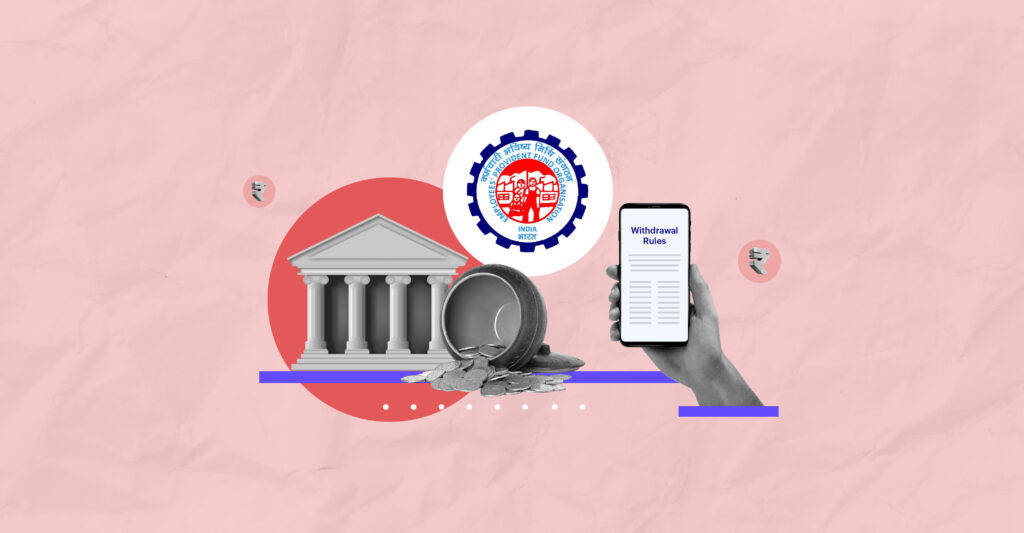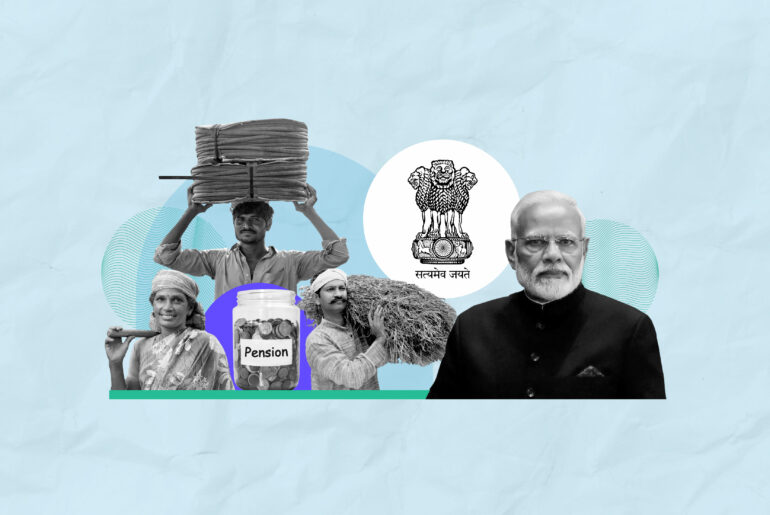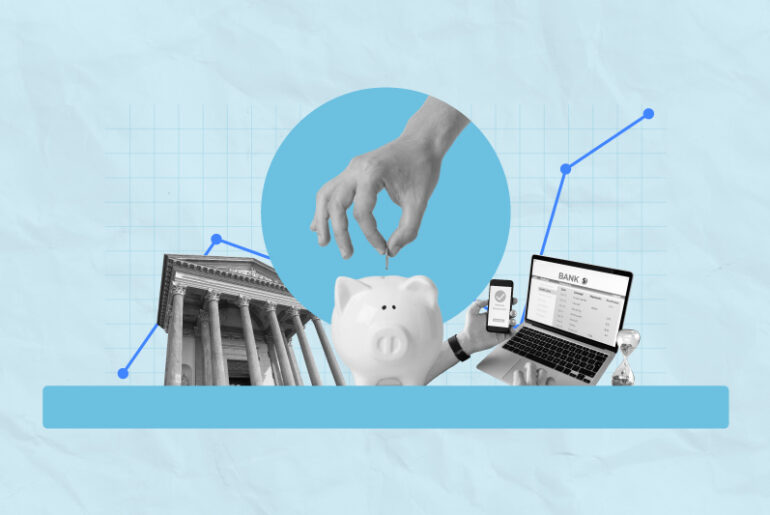Last Updated on Jul 8, 2022 by Aradhana Gotur
Employees’ Provident Fund (EPF) is a long-term retirement-based scheme. Both the employer and the employee contribute to the latter’s EPF account on a monthly basis throughout their service period. The accumulated amount plus interest thereon is only accessible after the employee retires. However, EPFO has allowed employees to make premature PF withdrawals in certain conditions subject to conditions. Read to find out how to withdraw PF amount online and offline. Also, read about PF withdrawal rules for full, partial, and advance claims, how to file grievances and more.
Table of Contents
Components of EPF contribution
12% of your basic salary plus Dearness Allowance (DA) goes directly towards your EPF account. However, the same is not in the case of your employer’s EPF contribution. Here’s how it is divided:
- 3.67% goes towards your EPF
- 1.1% goes towards EPF administration charges
- 0.5% goes towards Employees’ Deposit Linked Insurance (EDLI)
- 0.01% goes towards EDLI administration charges
- 8.33% goes towards the Employees’ Pension Scheme (EPS)
When can you withdraw PF?
You can withdraw the entire provident fund in the following cases:
- At the time of retirement.
- If you have been unemployed for 2 months.
- In case of your death before retirement, your nominee can withdraw.
Types of PF withdrawals
There are three types of PF withdrawals:
- PF final settlement
- PF partial withdrawal
- Pension withdrawal
EPF withdrawal rules
As the Employees’ Provident Fund is specially designed for salaried individuals to help them save for their sunset years, it is best to avoid withdrawal before retirement unless it is an emergency. If you still have to withdraw funds, you no longer need your employer’s approval. You can easily apply for PF withdrawal online via the EPFO. However, a prerequisite is that your UAN and Aadhaar should be linked. And your employer must have approved it.
A PF withdrawal is governed by some rules as discussed below:
- PF withdrawals made before completing 5 yrs of continuous service are taxable.
- The withdrawals are also fully taxable in case there is a break/gap in the contribution during the first 5 yrs.
- Withdrawals after completing 5 yrs of continuous service are tax-free.
- Withdrawals are not taxable if you were terminated or were unemployed due to ill health.
- On changing your job, you need not withdraw your provident fund. You can easily transfer the funds to a new account with your current employer.
- You can avail a loan on your employee provident fund.
- Withdrawal of funds transferred from your PF account to the National Pension Scheme (NPS) is exempt from tax.
- If you change jobs and thereby have a PF account, it will still be considered continuous service provided there is no gap in the contribution.
- You are required to use the Composite Claims Form for claims of partial withdrawal or final settlement.
- If you have linked your Aadhaar with UAN, you can directly submit the Composite Claims Form to the EPFO without getting an attestation from your employer.
- If you have not linked your Aadhaar with UAN, you have to submit the Composite Claims Form with your employer’s attestation to make a withdrawal.
Revised PF withdrawal rules
However, amid the coronavirus pandemic last year, EPFO revised several PF withdrawal rules to give easy access to financial resources to individuals who were unemployed before their retirement due to lockdown or retrenchment. As per the new rules, PF account holders are allowed to withdraw the lower of:
- 3 months’ basic salary plus dearness allowance
- 75% of the net balance in their PF account
PF partial withdrawal rules
Ideally, you can withdraw PF only after your retirement. However, there are certain situations when you can make premature withdrawals. Note the following advance PF withdrawal rules to plan your finances.
| Purpose | Eligibility | Limit |
| Construction/Purchase of a new house Conditions: 1. The asset should be in your name or jointly with your spouse 2. You can withdraw PF for this purpose once during your entire service 3. The construction should begin within 6 months and be completed within 12 months from the last withdrawal instalment date | Should have rendered service for at least 5 yrs | For land: Up to 24 times your monthly basic salary plus dearness allowance For a house: the lower of: 1. Up to 36 times your monthly basic salary plus dearness allowance 2. The cost of the property 3. The total of your and employer’s share plus interest |
| Medical emergency of self, spouse, parents or children | Any EPF member | The lower of: 1. Your share plus interest or six times your monthly basic salary |
| Renovation of a house | After 5 yrs of construction | 12 times your monthly salary |
| Repayment or downpayment of a home loan | Should have served for at least 3 yrs | 90% of the PF balance |
| Wedding of self, sibling or children | Should have served for at least 7 yrs | 50% of your share |
| Higher education of self or post matriculation of children | Should have served for at least 7 yrs | Up to 50% of your share of contribution to EPF |
| Member unemployed | For more than a month | 75% of your PF |
| Member unemployed | More than 2 months | Remaining 25% |
| Premature withdrawal a year before retirement/superannuation | Must be aged 54 yrs and above | 90% of EPF balance |
EPF withdrawal before 5 yrs of service
EPF withdrawals done before the completion of 5 yrs of continuous service will attract TDS. The 5 yrs of service include tenure with your previous employer too.
Rules of PF withdrawal after retirement
- If you are aged above 58 yrs, the EPF Act requires you to apply to claim the final settlement.
- The EPF account balance consists of your and your employer’s contribution.
- If, at the time of your retirement, you have rendered continuous services for over 10 yrs, you will also be eligible to claim the Employee Pension Scheme (EPS) amount.
- If you complete 10 yrs of service, you will get post-retirement pension benefits.
- EPF withdrawal post-retirement is tax-free.
- Interest earned on EPF after retirement is taxable.
- If you don’t withdraw funds 3 yrs after retirement, the interest earned will attract tax.
How to withdraw PF?
You can make PF withdrawal in two ways – online and offline. While an offline EPF claim may take up to 20 days to be settled, online claims for PF withdrawals are settled within three working days. Online withdrawals are made either via EPFO Member Portal or the UAN site. To get started, make sure that your UAN is linked with your Aadhaar card information. Use the Composite Claims Form to request a partial or full withdrawal.
PF withdrawal process online
The PF withdrawal process via the online mode is simple and takes a shorter time for settlement as compared to the offline route. Follow these steps for online withdrawal of PF money:
Step 1: Visit the EPFO website and launch the member portal.
Step 2: Go to the “Services” tab and select “For Employees”.
Step 3: Select the “Member UAN/Online Service (OCS/OTCP)” option and wait to be redirected to a new window.
Step 5: Under the “Manage” tab, select the “KYC” option and wait to be redirected to a new page.
Step 6: Go to the “Digitally Approved KYC” section at the bottom of the article and check your KYC details. Verify their correctness.
Step 7: In the top menu, select the “Online Service” option.
Step 8: From the drop-down menu, select the “CLAIM (FORM-31, 19 & 10C)” option.
Step 9: Wait to be redirected to a new webpage with an automatically generated “ONLINE CLAIM (FORM 31, 19 & 10C)” form.
Step 10: Verify your registered bank account number by entering the last four digits.
Step 11: Once your bank account is verified, a “Certificate of Undertaking” will be generated. Click “Yes” on the pop-up.
Step 12: Click on the “Proceed for Online Claim” option when asked.
Step 13: For online EPF withdrawal, select the “PF ADVANCE (FORM – 31)” from the drop-down menu next to the “I want to apply for” option.
Step 14: Select the reason for the claim from the drop-down options next to “Purpose for which advance is required”. Also, fill up the fields for your address and advance amount.
Step 15: To submit your withdrawal application, tick the checkbox at the end of the page.
Step 16: Depending on the nature of the withdrawal, you will be required to upload certain scanned documents.
Step 17: Wait for your employer to approve the withdrawal request. Once approved, the withdrawal amount will be deposited into your bank account. You will receive an SMS on your registered mobile number once the EPF claim has been settled.
How to withdraw PF online with UAN?
PF withdrawal using UAN involves the following steps:
Login to the UAN portal
Launch the UAN portal. Log in with your UAN and password. Then enter the captcha.
Verify KYC
To proceed, you will have to verify your KYC. To do this, select ‘Manage’ and click on ‘KYC’ and verify the details like PAN, Aadhaar, and bank account.
Choose claim form
After verifying KYC, visit ‘Online Services’ and choose the claim (Form-31, 19 and 10C). Enter your bank account number and click on ‘Verify’. Sign the certificate by selecting ‘Yes’. Then choose ‘Proceed for Online Claim’.
Choose the type of PF withdrawal
As discussed, there are three types of PF withdrawals – full EPF settlement, partial withdrawal (loan/advance) or pension withdrawal. Choose the one that applies to you and submit the application.
EPF withdrawal online claim forms
Now that you know the PF withdrawal process, let’s understand the relevant online forms to be used. To make a pension or PF withdrawal, you are required to submit PF withdrawal claim forms, which differ as per the employee’s age, the reason for the claim, and your employment status. While Form 19, Form 31, and Form 10C were used previously, these are now replaced by Composite Claim Forms.
How to enter the exit date to hasten your EPF withdrawal?
One of the reasons for the delay in your PF withdrawal could be that your exit date from your previous employer is not mentioned. Previously, only the employer could update this, but now EPFO allows you to do it through the Unified Portal. Follow these steps to enter the exit date:
Step 1: Log in to the UAN portal using your Unified Account Number (UAN) and password.
Step 2: Check whether the exit date is mentioned by selecting ‘Service History’ under ‘View’ on the header.
Step 3: If not updated, click on ‘Manage’ on the top panel and then on ‘Mark Exit’.
Step 4: Choose your employer from the drop-down option.
Step 5: Wait to be directed to a new page. Here, enter your date of birth, joining, and exit. The date of exit should match the one mentioned in your resignation letter.
Procedure for EPF withdrawal offline
Step 1: Download the Composite Claim Form (Aadhaar/Non-Aadhaar)
Step 2: If you have entered your bank account and Aadhaar details on the UAN portal, use the Composite Claim Form (Aadhaar). Fill up the form and submit it without your employer’s signature to the EPFO office.
Step 3: If your Aadhaar details are not updated on the UAN portal, you can use the Composite Claim Form (Non-Aadhaar). Fill this up and submit it with your employer’s attestation to the EPFO office.
Criteria for PF withdrawal
As mentioned earlier, the PF claim form varies based on certain criteria.
- When you/employee is still under service
You can make an advance withdrawal from your PF account by submitting the composite claim form (Aadhaar/Non-Aadhaar).
You can fund your LIC policy through the EPF account using Form 14.
You can apply for a monthly pension by submitting Form 10D if you have completed 10 yrs of eligible service. If you haven’t completed the 10 yrs of eligible service, you are required to submit the Composite Claim Form.
2. When an employee/you switch the job
- Use Form 13 to transfer your EPF account.
- When you leave an organisation and don’t join another, you can make a claim on PF and pension using the Composite Claim Form.
- If you are aged above 58 yrs and have completed 10 yrs of eligible service, you can make a PF claim using the Composite Claim Form and a pension claim using Form 10D.
3. When an employee leaves an establishment due to a physical disability
- You can claim PF using the Composite Claim Form.
- You can claim pension using Form 10D.
- If you are aged above 58 yrs and have not completed 10 yrs of eligible service, you can claim the PF and pension using the Composite Claim Form.
4. When an employee/you are deceased while in employment
- If you are aged below 58 yrs while in service or aged above 58 yrs and have completed 10 yrs of eligible service, your nominee/heir/beneficiary can file for the PF settlement using Form 20. To claim a monthly pension, they need to use Form 10D. Finally, Form 5IF should be used to claim EDLI (Employees’ Deposit Linked Insurance).
- If you are aged above 58 yrs and have not completed 10 yrs of eligible service, your nominee/heir/beneficiary can claim PF using Form 20, pension using the Composite Claim Form, and EDLI using Form 5IF.
Documents required for PF withdrawal
- Universal Account Number (UAN)
- Employees’ bank account details
- An employer is required to submit their employee details to the EPFO. They should also state the joining and exit date correctly
Tax on EPF withdrawals
EPF withdrawals are taxable under certain circumstances. The following table will detail the taxation:
| Scenario | Taxation |
| Withdrawal is less than Rs. 50,000 before completing 5 yrs of continuous service | No TDS. However, if you fall under a taxable bracket, you have to offer such EPF withdrawal in your ITR |
| Withdrawal is over Rs. 50,000 before completing 5 yrs of continuous service | Attracts TDS at 10% if PAN is furnished. No TDS if Form 15G/15H is furnished |
| Withdrawal of EPF after 5 yrs of continuous service | No TDS. You need not offer such withdrawal in your ITR as it is exempt from tax |
| Transfer of EPF from one account to another on job change | No TDS. You need not offer this in ITR, as it is not taxable |
| Before completing 5 yrs of continuous service | Attracts TDS at 10% if PAN is furnished. If not, TDS at 30% is applicable. |
| 1. Termination of employment due to your ill health 2. Employer’s business is discontinued 3. The reasons for withdrawal are beyond your control | No TDS. You don’t have to offer this in your ITR as such withdrawals are exempt from tax |
How to save TDS on PF withdrawal?
- Instead of withdrawing your EPF corpus when changing your job, transfer it to the new EPF.
- When unemployed, avoid withdrawing EPF. The EPF balance will earn interest for up to 3 yrs even though there’s no contribution. However, the interest earned in this period attracts tax.
- Withdraw funds after 5 yrs of continuous service.
Rates of TDS on EPF withdrawals
- TDS is deducted at 10% on EPF withdrawals before 5 yrs of continuous service in case you have submitted your PAN. In case you don’t furnish PAN details, TDS is deducted at the highest slab rate of 30%.
- TDS is not deducted if you submit Form 15G/Form 15H. You can submit these forms if your total income, including EPF withdrawal, is below the taxable limit.
How to register a grievance for PF withdrawal?
You can register grievances by visiting the EPF grievance management system online. To do this, follow these steps:
Step 1: Visit the EPFO Grievance Management System
Step 2: Click on ‘Register Grievance’
Step 3: Fill out the grievance registration form
Step 4: Choose your status from the drop-down option
Step 5: Fill up your PF number, your establishment, address, complainant’s name, contact details, grievance details and others.
Step 6: Click ‘Submit’ after entering the captcha code.
Types of EPFO grievances
You can register a grievance related to the following issues:
- Transfer of your PF accumulations (F-13)
- Return or misplacement of cheque
- Settlement of your pension (10-D)
- Provision of PF balance or PF slip
- Scheme certificate (10C)
- Others
Once you file a grievance online, you can check its status on the portal. In case you don’t get a resolution within the stipulated time, you can send a reminder by clicking on ‘Send Reminder’. Keep your grievance registration number and password, if any, handy.
FAQs
How to withdraw the PF amount online?
There are two ways of withdrawing the PF amount online. First, you can withdraw your balance using your UAN credentials. Second, you can do so by visiting the EPFO website.
What are the limits on advance PF withdrawal?
You can make an advance withdrawal from your PF accounts in certain situations as follows:
1. To fund a marriage – 3 times
2. To pursue post-matriculation education – 3 times
3. To purchase/construct a house or land – 1 time
4. To fund a medical emergency or treat a critical illness – no limit
Do I have to submit Form 15G/H along with the EPF withdrawal form?
Yes. You have to submit Form 15G/H in case you want to make an EPF withdrawal before completing a service of continuous 5 yrs, and your taxable amount, including the withdrawal, is nil.
Can I make an EPF claim online without logging into the EPFO Portal?
Yes, you can make an EPF claim online. To do this, you will have to download or get a Composite Claim Form, fill it up and submit it with the EPFO.
Is it compulsory to submit my PAN details at the time of EPF withdrawal?
Yes, it is necessary if you want to make a partial withdrawal from your EPF account. If not, as per the PF advance withdrawal rules, you will attract TDS at the highest slab (30% currently) or more on the amount withdrawn. In contrast, a TDS of 10% is applicable if you submit your PAN.
Why can’t I withdraw my EPF balance while working?
EPF is specially designed to allow salaried individuals to save for their retirement. Therefore, it is discouraged to withdraw the funds while working. However, EPFO allows you to make advance EPF withdrawals in some instances.
Can I withdraw EPF after losing my job?
As per the latest EPFO regulations, you can withdraw 75% of your accumulated corpus if you are terminated from your job and are unemployed for a month. If you continue to be unemployed for another month, you can withdraw the remaining 25%.
Can I withdraw the full PF amount before retirement?
Withdrawal of PF balance entirely is only allowed after you retire. The retirement age is above 55 yrs. If you retire before this, you cannot receive the entire corpus. However, you can withdraw 90% of your EPF corpus a year before you retire, provided you are not less than 54 yrs.
Can I claim a tax exemption on EPF withdrawals?
PF withdrawals made before completing 5 yrs of continuous service are taxable. Withdrawals made after rendering service for a continuous 5 yrs are tax-exempt.
Do I need my employer’s approval to withdraw EPF?
No, you don’t need your employer’s approval to withdraw your EPF. You can claim for withdrawal directly with the EPFO. However, your employer’s attestation is mandatory in case your Aadhaar and UAN are not linked.
Can I withdraw EPF without UAN?
Yes. Submit a duly filled PF withdrawal form at the Regional Provident Fund Office. You can check the jurisdiction of your PF office via the alpha-numeric PF account number, which mentions the state and location from your pay slip. To withdraw PF funds in this way, you have to submit your identity attestation from a bank manager, magistrate or gazette officer.
Are EPF contributions eligible for tax deductions?
Yes. You can claim a tax deduction on EPF contributions under Section 80C of the Income Tax Act, 1961.
Can I increase my EPF contribution?
Yes. You can increase your EPF contributions up to 100% of your basic pay to the Voluntary Provident Fund (VPF) account, which is an extension of EPF.
Will the employer also increase their contribution when I do?
No. The employer is not obligated to increase their contribution to your EPF. They will continue to contribute their portion as usual.
What happens to an EPF account on quitting or switching jobs?
Once you quit your job, your EPF account will still be active; however, it will not receive monthly contributions. When you join a job, your new employer will create a new EPF account under the same UAN. You can transfer the funds from the old account to the new EPF account.
If you don’t join a new employer, you will get 3 yrs from your last contribution to withdraw your EPF in full. If you don’t withdraw, your EPF account will become inactive, and the funds don’t attract interest. Accessing funds from an inactive EPF account requires you to go through complex procedures.
How are EPF withdrawals taxed?
As discussed, EPF payout has four components:
1. Your/employee’s contribution: This component of your EPF is not taxable. However, in earlier years, if you have claimed a deduction under Section 80C on your contribution in earlier years, you may attract additional tax as if you hadn’t claimed 80C benefits for those years.
2. Interest on your/employee’s contribution: This portion is taxed as income from other sources.
3. Employer’s contribution: This component is fully taxable under the head salary. You can see TDS on such amounts in Form 26AS.
4. Interest on employer’s contribution: This component is also fully taxable under the head salary. TDS on such income also appears in Form 26AS.




